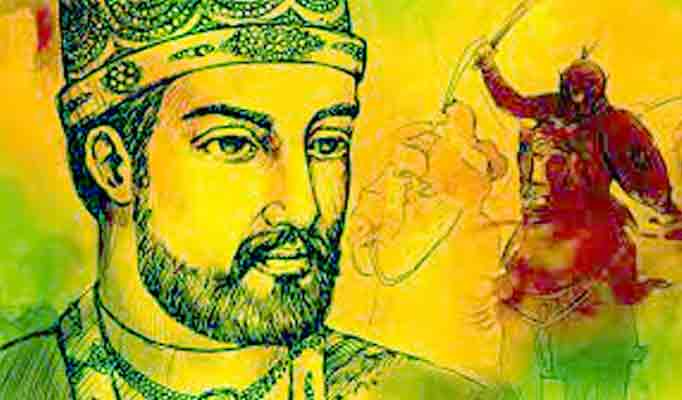
Alaul Alam

Muhammad bin Bakhtiyar Khalji was a prominent historic figure who established the foundation of Islamic era in Bengal in the middle ages. He was a great Muslim warrior supposed to be credited with beginning a golden episode in Bengal although his heroic deeds remain unsung in many cases. Although there was not much information about his early life, different historic sources claimed that he was born in 1150 AD at the city of Garmsir in Afghanistan. In his early days he tried to enter the military service but was rejected two times–one in Ghazni and another in Delhi.
However, due to his relentlessness and strong-will power he could manage a job under Maklik Hizbar al-Din despite his short physical stature with long arms extending below his knees and an unfavorable appearance. But his sky-high ambition made him untamed to leave the work of an ordinary soldier.
In search of a better option he then went to Oudh and the ruler of Oudh Malik Husam Uddin vested him a landed state in the south-eastern corner of modern Mirzapur district knowing about his worth and valiance which brought Bakhtiyar Khalji a scope to gather a large number of adventurers around him in order to carry out raids into neighboring countries.
The world knew about the heroism of Bakhtiyar Khalji when he started invading to different lands and making success at his every single raid. His far-sighted and ceaseless attitudes helped him become a Turko-Afghan military general of the Ghurid ruler Muhammad Ghor from an ordinary rank. He was a crowned fighter who led a series of attacks to the neighboring territories in his short life span. Contemporary historians stated that despite short physical stature Bakhtiyar Khalji was active, bold, brave, intelligent and agile which helped him establish his power and become well-known in the Indian subcontinent.
He built up a strong-armed force with the fierce Muslim soldiers and carried out commando operation in the neighboring regions successfully which boosted up his confidence to keep his raids continue to different lands including Bangla, Bihar and Orisha. He captured Bengal and pioneered Muslim rule there. He was the founder of Khalji dynasty which reigned Bengal from 1203 to 1227 AD.
Many historians claim that the invasion of Bakhtiyar Khalji to Bengal was not merely an incident of capturing Bengal. Rather, behind his invasion there was also an aim to establish Muslim reign in India. Between 1203-1204 AD Bakhtiyar Khalji invaded Bengal and defeated Lakshmana Sen who was the last major Sena king of Bengal and captured northwest Bengal.
Bakhtiyar Khalji attacked Nadia, one of the capital cities of Lakshmana Sen with only 18 of horsemen using a different route sensing the presence of Lakshmana Sen’s soldiers in the primary route. His skills as a cavalry soldier easily expose when we know that he advanced towards Bengal in such a speed that only 18 soldiers could able to follow him though the rest of his soldiers joined the invasion within a short while.
He was victorious as the old king Lakshmana Sen fled through the backdoor of his palace hearing the instant attack of Khalji. After capturing Bengal, he sketched an ambitious attempt to seize Tibet. However, he could not get success in the invasion to Tibet. The deterioration of his health condition and loss of many of his soldiers compelled him to retreat from the mission. Shortly afterwards, Ali Mardan Khalji, one of his commanders killed him.
Different ancient sources claim that Bakhtiyar Khalji contributed much to bring fortunes to the people in Bengal. He was a good administrator who divided the Kingdom into a number of districts and o rule each district smoothly he appointed individual noble and military chief entrusted with the responsibility for maintaining peace and order, collecting revenues, patronizing learning and culture and enhancing the moral and material well-being of the people.
The initiatives including the beginning of reading the Khutbah (verses of the holy Quran) and introducing coins in his name were widely acclaimed. Apart from patronizing Islamic laws he is credited for establishing a new capital in Gaur and building two cantonment towns near Dinajpur and Rangpur. He engaged himself in the construction of numerous mosques, madrasahs and khanqahs to enlighten the people with the Islamic spirit.
With his direct patron Gaur had been an important center for Islamic learning and culture during the medieval period. For enhancing Guar as well as spreading Islamic culture in Bengal he brought with him a number of scholars, artisans, and architects. Poet Al Mahmud in the early 1990’s wrote a book of poetry ‘Bokhtiyarer Ghora (Horses of Bakhtiyar) in which he sketched Khalji as the praiseworthy figurehead of conquest of Bengal. The book also depicted that during the reign of Bakhtiyar Khalji the Muslim missionaries in India achieved the greatest success with converting many to Islam.
Muslim reign began with the advent of Bakhtiyar Khalji in Bengal continued for more than five hundred years from 1204 AD to 1757 AD. After his death in 1206 AD the control of Bengal came under Turkish rulers and later on under the Mughals. However, Khalji was not merely a great warrior with an aim to conquer kingdom and look for a fortune, rather his contribution in social balance and communal harmony based on Muslim conventions and culture led Bengal towards peace and prosperity.
It is no denial that despite significant development in Bengal during the reign of Bakhtiyar Khalji, he was not without controversary. To some he was more than a hero while some others called him a ruthless ruler who was believed to be accused of destroying Hindu temples and shrines during his conquests and continue to sketch him an infamous figure in the history who is held responsible for the destruction of Nalanda and the oppression upon the Buddhists during his invasion to Bihar.
But how his actions led to the oppression of non-Muslim communities are in many cases raise questions. Different historic sources have strongly claimed that Bakhtiyar Khalji was nether responsible for the decline of Nalanda nor the disappearance of Buddhists, rather Buddhism slowly faced declination in India after the Pala rule.
The question is; how far we are pertinent to give Bakhtiyar Khalji an infamous title without having sufficient ground to blame him? Certainly, he was a great hero as well as a great warrior who deserves our appreciations for enormous contribution to the people of Bengal including Muslim and non-Muslim communities. So, let us avert the bias information about Khalji and sing his heroism.
Alaul Alam: teaches at Prime University. He is also a Research Scholar at the IBS
Email: malaulalam@gmail.com






